Irene Papas facts for kids
Quick facts for kids
Irene Papas
|
|
|---|---|
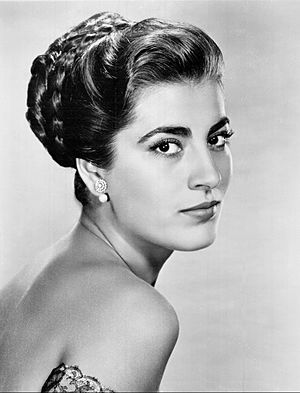
Papas in 1956
|
|
| Born |
Irene Lelekou
3 September 1929 Chiliomodi, Corinthia, Greece
|
| Died | 14 September 2022 (aged 93) Chiliomodi, Corinthia, Greece
|
| Nationality | Greek |
| Occupation | Film and theatre actress, singer |
| Years active | 1948–2003 |
| Known for | Heroines of Greek tragedy; powerful stage presence |
|
Notable work
|
The Guns of Navarone Zorba the Greek Z The Trojan Women Iphigenia Antigone Electra |
| Spouse(s) |
Alkis Papas
(m. 1947; div. 1951) |
| Relatives | Manousos Manousakis (nephew) |
Irene Papas (born Eirini Lelekou; 3 September 1929 – 14 September 2022) was a famous Greek actress and singer. She starred in over 70 movies during her career, which lasted more than 50 years. She became known around the world for popular films like The Guns of Navarone (1961), Zorba the Greek (1964), and Z (1969).
Irene Papas was especially good at playing strong women in movies based on ancient Greek stories. These included The Trojan Women (1971) and Iphigenia (1977). She also played the main characters in Antigone (1961) and Electra (1962). She won several awards for her acting, including Best Actress at the Berlin International Film Festival for Antigone.
Contents
Early Life and Acting Dreams
Irene Papas was born as Eirini Lelekou on 3 September 1929. Her hometown was Chiliomodi, a village near Corinth, Greece. Her mother was a schoolteacher, and her father taught classical drama.
From a young age, Irene loved to act. She would make dolls and put on shows for other children. When she was seven, her family moved to Athens. At 15, she started studying at the Royal School of Dramatic Art in Athens. She also took classes in dance and singing. She felt the school's acting style was old-fashioned, but she graduated in 1948.
Irene Papas' Acting Career
Theatre Performances
Irene Papas started her acting journey in Greece. She performed in different types of plays, including works by famous writers like Henrik Ibsen and William Shakespeare. She also acted in classical Greek tragedies.
Even after she started making movies in 1951, she still performed on stage. She acted in plays in New York City, such as Iphigenia in Aulis on Broadway in 1968. In 1973, she starred in Medea on Broadway. Critics praised her performance, saying she showed strong, controlled emotions.
Film Roles in Europe
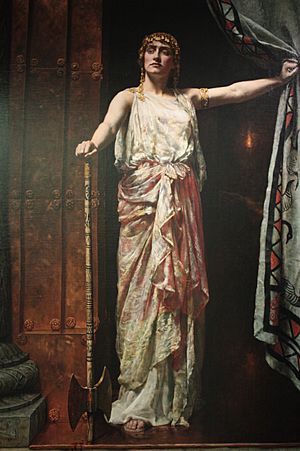
Irene Papas was discovered by director Elia Kazan in Greece. Her first small film role was in Fallen Angels (1948). She gained more attention with her role in Dead City (1952). This film was shown at the Cannes Film Festival, where the international press noticed her.
She then signed with Lux Film in Italy and became a film star there. She appeared in Italian films like Attila and Theodora, Slave Empress in 1954. These roles caught the eye of Hollywood. She continued to make many films in both Greece and other countries.
Irene Papas was known for playing leading roles in movies based on ancient Greek stories. She played the main character in Antigone (1961) and Electra (1962). Her strong acting in Electra made her a big star. She also played Helen of Troy in The Trojan Women (1971) and Clytemnestra in Iphigenia (1977).
Hollywood Film Appearances
Irene Papas first appeared in an American film in The Man from Cairo (1953). Her next American role was much bigger, alongside James Cagney, in Tribute to a Bad Man (1956).
She then starred in major international films that made her famous worldwide. These included The Guns of Navarone (1961) and Zorba the Greek (1964). The film Zorba the Greek was based on a famous novel and featured music by Mikis Theodorakis.
Papas also played important roles in other highly praised films. In Z (1969), she played the unforgettable role of a political activist's widow. She also appeared as Catherine of Aragon in Anne of the Thousand Days (1969), alongside Richard Burton. Later, she starred in Mohammad, Messenger of God (1976) and Lion of the Desert (1982). One of her last film roles was in Captain Corelli's Mandolin in 2001.
Becoming a Star
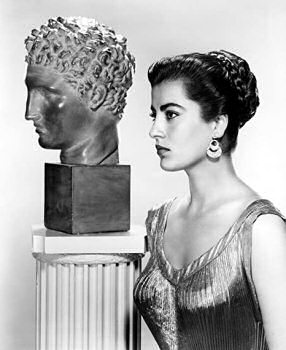
Irene Papas was seen as a classic Mediterranean beauty. She had a lovely voice and great talent. Many people considered her the most recognizable Greek film star. She was known for playing strong women who were beautiful, emotional, and very independent.
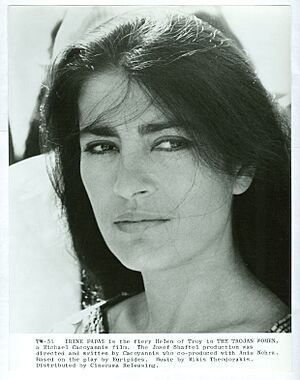
When asked about acting for film or stage, or in classical versus modern roles, Papas said the acting techniques were the same. She believed that how one feels about life and death drives their actions. She felt that death was a powerful force that made people decide what to do with their lives.
Singing Career
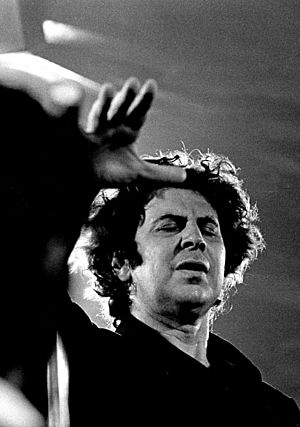
In 1969, Irene Papas released a solo music album called Songs of Theodorakis. It featured 11 songs sung in Greek, with music by Mikis Theodorakis. She had worked with Theodorakis before on the film Zorba the Greek. A critic said that her acting background made her singing very intense.
In 1972, she appeared on the album 666 by the Greek rock band Aphrodite's Child. In 1979, she released another album called Odes. This album featured eight Greek folk songs with electronic music by Vangelis. They worked together again in 1986 on Rapsodies, an album of Byzantine church hymns with electronic music.
Political Views
Irene Papas was a lifelong supporter of liberal ideas. In 1967, when a military government took power in Greece, she spoke out against it. She called for a "cultural boycott" against the regime. Because of her opposition, she and other artists, like Mikis Theodorakis, had to leave Greece. She lived in Italy and New York for a while. When the military government fell in 1974, she returned to Greece. She continued to work in Rome but also spent time in Athens and her family's village.
Personal Life
In 1947, Irene Papas married film director Alkis Papas, but they divorced in 1951. She later met actor Marlon Brando in 1954. They had a long relationship that they kept private at the time. Years later, she said that he was "the great passion of my life." Her second marriage was to film producer José Kohn in 1957, but it was later ended. She was also the aunt of film director Manousos Manousakis.
In 2003, she joined the board of the Anna-Marie Foundation. This group helped people in rural areas of Greece. In 2013, she began to suffer from Alzheimer's disease. Irene Papas spent her last years in her home village of Chiliomodi. She passed away there on 14 September 2022, at the age of 93.
Awards and Recognitions
Irene Papas received many awards and honors throughout her career:
- 1961: Best Actress at the 11th Berlin International Film Festival for Antigone.
- 1962: Best Actress at the Thessaloniki International Film Festival for Electra.
- 1971: Best Actress from the National Board of Review for The Trojan Women.
- 1993: Golden Arrow Award for her lifetime achievements at the Hamptons International Film Festival.
- 1993: Flaiano Prize for Theatre (Career Award).
- 2009: Golden Lion career award at the Venice Biennale.
She also received special honors from Greece, France, and Spain for her contributions to the arts. In 2017, it was announced that a new drama school in Athens would be named the "Irene Papas – Athens School" in her honor.
Discography
- 1968 : Songs of Theodorakis
- 1972 : 666 from Aphrodite's Child (chanting on ∞)
- 1979 : Ωδές – Odes – with Vangelis
- 1986 : Ραψωδίες – Rapsodies – with Vangelis
Filmography
- Fallen Angels (1948) as Liana
- Dead City (1951) as Lena
- The Unfaithfuls (1953) as Luisa Azzali
- Come Back! (1953)
- The Man from Cairo (1953) as Yvonne Lebeau
- Vortex (1953) as Clara
- Theodora, Slave Empress (1954) as Faidia
- Attila (1954) as Grune
- Tribute to a Bad Man (1956) as Jocasta Constantine
- The Power and the Prize (1956)
- Bouboulina (1959) as Laskarina Bouboulina
- The Guns of Navarone (1961) as Maria
- Antigone (1961) as Antigone
- Electra (1962) as Electra
- The Moon-Spinners (1964) as Sophia
- Zorba the Greek (1964) as the widow
- Trap for the Assassin (1966) as Julia de Noirville
- Witness out of Hell (1966) as Lea Weiss
- We Still Kill the Old Way (1967) as Luisa Roscio
- The Desperate Ones (1967) as Ajmi
- The Odyssey (1968, TV Mini-series) as Penelope
- The Brotherhood (1968) as Ida Ginetta
- Ecce Homo (1968) as Anna
- Z (1969) as Helene
- A Dream of Kings (1969) as Caliope
- Anne of the Thousand Days (1969) as Queen Katherine
- The Trojan Women (1971) as Helen of Troy
- Oasis of Fear (Un posto ideale per uccidere, 1971) as Barbara Slater
- Rome Good (1971) as Elena Teopoulos
- N.P. (1971) as the housewife
- Don't Torture a Duckling (1972) as Dona Aurelia Avallone
- 1931, Once Upon a Time in New York (1972) as Donna Mimma
- Battle of Sutjeska (1973) as Boro's mother
- I'll Take Her Like a Father (1974) as Raimonda Spina Tommaselli
- Moses the Lawgiver (1974) (TV miniseries) as Zipporah
- Mohammad, Messenger of God (1976) as Hind bint Utbah
- Blood Wedding (1977) as the mother
- Iphigenia (1977) as Clytemnestra
- The Man of Corleone (1977)
- Christ Stopped at Eboli (1979) as Giulia
- Bloodline (1979) as Simonetta Palazzi
- Ring of Darkness (1979) as Raffaella
- Lion of the Desert (1981) as Mabrouka
- The All Pepper Social Worker (1981) as the fairy
- Manuel's Tribulations (1982) (TV series)
- The Ballad of Mameluke (1982)
- Eréndira (1983) as the grandmother
- Why Afghanistan? (1983) as cultural attaché
- The Deserter (1983) as Mariangela
- In the Shade of the Great Oak (1984) (TV mini-series)
- Into the Night (1985) as Shaheen Parvizi
- The Assisi Underground (1985) as Mother Giuseppina
- Sweet Country (1987) as Mrs. Araya
- Chronicle of a Death Foretold (1987) as Angela's mother
- High Season (1987) as Penelope
- A Child Named Jesus (1987) (TV film)
- The Cardboard Suitcase (1988) (TV miniseries), as Maria Amélia
- Plato's Banquet (1988) as Diotima
- Island (1989) as Marquise
- The Green-eyed Cavaliers (1990) as Anasthasie Rouch
- The Detective Inspector (1993) as Maria
- Stolen Love (1993)
- Jacob (1994) (TV film) as Rebeccah
- Melvin, Son of Alvin (1994) as Mrs. Hasim
- Party (1996) as Irene
- The Odyssey (1997) (TV miniseries) as Anticlea
- Anxiety (1998) as the mother
- Yerma (1998) as the old pagan woman
- Captain Corelli's Mandolin (2001) as Drosoula
- A Talking Picture (2003) as Helena
See also
 In Spanish: Irene Papas para niños
In Spanish: Irene Papas para niños
 | Stephanie Wilson |
 | Charles Bolden |
 | Ronald McNair |
 | Frederick D. Gregory |

